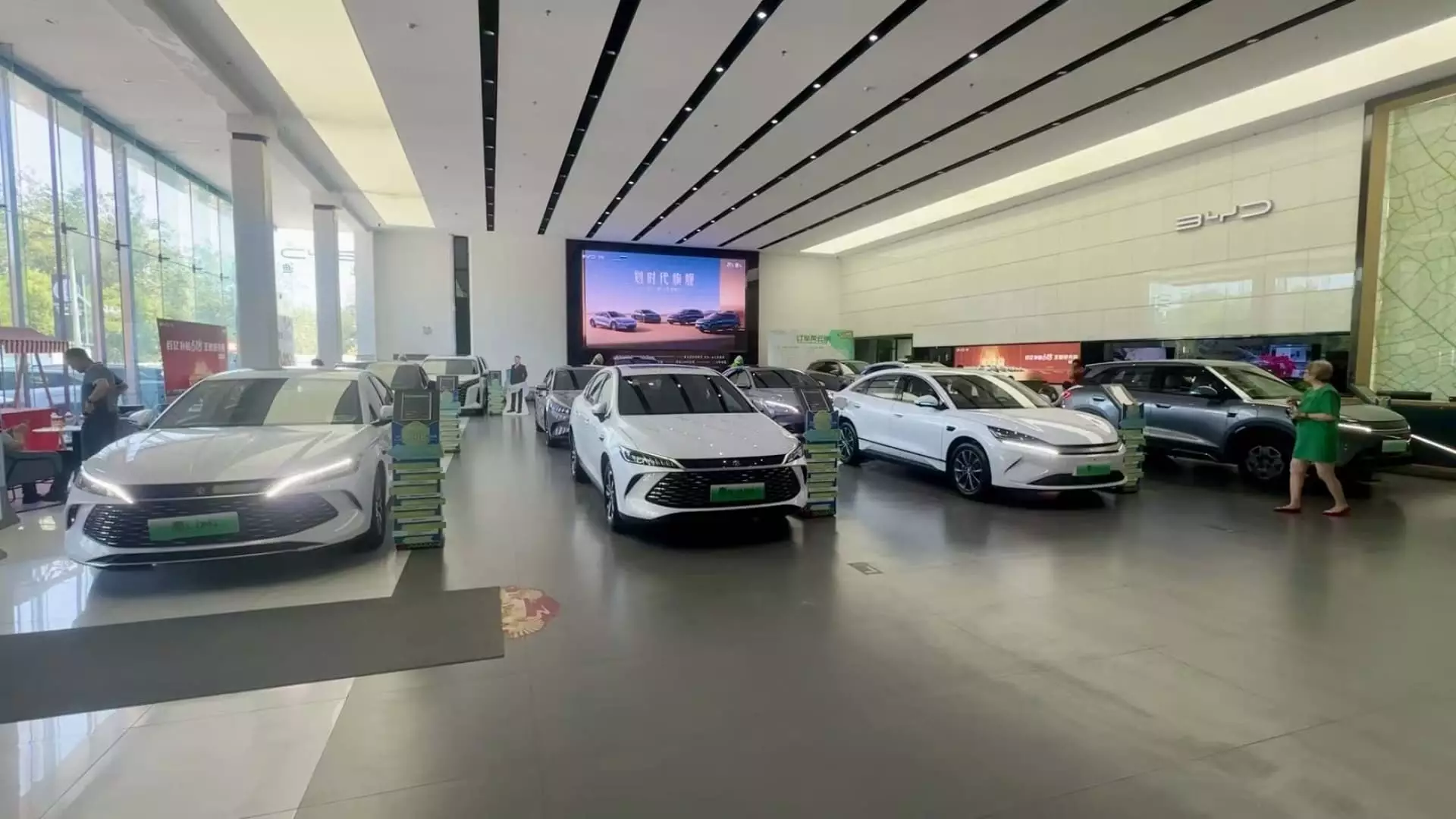As China emerges as a front-runner in the global electric vehicle (EV) landscape, a paradoxical crisis is unfolding that raises serious questions about the sustainability of this rapid expansion. Salesman Ma Hui’s worries in Beijing’s bustling used car market reflect a larger concern: the frantic race to cut prices among EV manufacturers is transforming a thriving innovation sector into a cutthroat battleground. The irony is striking; while the world admires China’s commitment to eco-friendly transportation, the reality of the situation appears grim. In the quest for market dominance, companies like BYD have triggered a severe price war that may ultimately revolve around destruction rather than growth.
The dilemma isn’t unique to Ma. His sentiments echo a widespread feeling among industry professionals who find themselves trapped in a precarious position—surrounded by competitors willing to sacrifice profit margins to fend off economic decline. The extreme price reductions, some as high as 34%, signal desperation rather than strategic maneuvering. When a vehicle like BYD’s Seagull mini hatchback can be purchased for a mere $7,700, it raises alarm bells not just for profitability but for the perceived value of the entire EV sector. If this trajectory continues, it could lead to a widespread disillusionment with electric vehicles, a notion that should appall any forward-thinking policymaker.
National Concerns Amid Global Accusations
Accusations about China flooding global markets with cheap electric vehicles are no longer just the musings of critics abroad; they have transformed into rampant discussions within China itself. The discourse has shifted from external scrutiny to the realization that internal stability—and the well-being of workers—is at risk due to “disorderly” pricing wars. The Communist Party’s People’s Daily, typically an unwavering supporter of government policies, recently turned its gaze inward, indicating a growing concern about the sustainability of this reckless competition.
Such dramatic reactions from state-affiliated outlets suggest potential repercussions that go beyond mere profits and losses. Creating an industry characterized by unsustainable practices endangers the livelihoods of countless workers who rely on automotive sales and production for their sustenance. With reports highlighting “zero mileage used cars”—a clever yet ethically dubious trick employed by manufacturers and dealers to inflate their sales figures—one can only wonder how deep the illusion of success has penetrated the industry.
The Parallels with the Real Estate Crisis
Drawing parallels between the automotive sector and China’s beleaguered real estate market is not merely sensationalism; it’s indicative of genuine concern. The chairman of Great Wall Motor, Wei Jianjun, aptly cautioned that an “Evergrande-like” crisis is lurking, ready to erupt if the current trends persist. His remarks resonate with urgency, as collapsing industries due to greed and recklessness often take years to recover from—if they recover at all.
Instead of producing grand innovations that foster sustainable growth, the industry appears to be fixated on short-term financial maneuvers that come at the expense of long-term stability. This blind pursuit of market share risks relegating the electric vehicle revolution to a mere sideshow, overshadowed by catastrophic failures in management and strategy. If we are not careful, we may witness the storied narrative of China’s EV industry devolve into a cautionary tale of ambition gone awry.
Impact on Consumers: A Cautionary Tread
Amid an economic landscape already characterized by consumer caution, the current race to the bottom is disheartening. Not only are manufacturers caught in a struggle for survival, but consumers are becoming increasingly reluctant to make purchases amid a swirling storm of price fluctuations. The reality is stark: as vehicle prices drop precipitously, what should be seen as a buyer’s market may actually transform into a waiting game for many consumers, further stalling an already fragile economy.
With potential buyers hesitating to invest in EVs, one can’t help but ponder the future of environmentally friendly transportation in China. If consumers begin to sense that better deals may be on the horizon, they could defer their purchases indefinitely, resulting in a downward spiral that crushed not just profits but also the industry’s potential to drive societal change.
The once-promising future of China’s electric vehicle industry is at a crossroads, and unless reforms and strategic adjustments occur, it risks being labeled as an unsalvageable sector suffering from self-inflicted wounds. The unimpeded race to the bottom cannot serve as a sustainable path forward, and it is high time for both industry leaders and policymakers to recalibrate their strategies before this vital sector implodes from its own excesses.


Leave a Reply